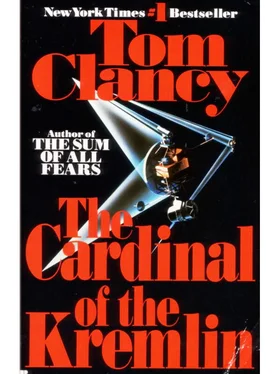Tom Clancy - The Cardinal of the Kremlin
Здесь есть возможность читать онлайн «Tom Clancy - The Cardinal of the Kremlin» весь текст электронной книги совершенно бесплатно (целиком полную версию без сокращений). В некоторых случаях можно слушать аудио, скачать через торрент в формате fb2 и присутствует краткое содержание. Год выпуска: 1988, Жанр: Триллер, на английском языке. Описание произведения, (предисловие) а так же отзывы посетителей доступны на портале библиотеки ЛибКат.
- Название:The Cardinal of the Kremlin
- Автор:
- Жанр:
- Год:1988
- ISBN:нет данных
- Рейтинг книги:3 / 5. Голосов: 1
-
Избранное:Добавить в избранное
- Отзывы:
-
Ваша оценка:
- 60
- 1
- 2
- 3
- 4
- 5
The Cardinal of the Kremlin: краткое содержание, описание и аннотация
Предлагаем к чтению аннотацию, описание, краткое содержание или предисловие (зависит от того, что написал сам автор книги «The Cardinal of the Kremlin»). Если вы не нашли необходимую информацию о книге — напишите в комментариях, мы постараемся отыскать её.
The Cardinal of the Kremlin — читать онлайн бесплатно полную книгу (весь текст) целиком
Ниже представлен текст книги, разбитый по страницам. Система сохранения места последней прочитанной страницы, позволяет с удобством читать онлайн бесплатно книгу «The Cardinal of the Kremlin», без необходимости каждый раз заново искать на чём Вы остановились. Поставьте закладку, и сможете в любой момент перейти на страницу, на которой закончили чтение.
Интервал:
Закладка:
"How's that?" Ryan asked.
"Well, on one hand, if you're hitting a moving target – and low-earth-orbit birds move across the sky pretty fast; something like eight thousand meters per second – there are fourteen hundred meters per degree of arc; so we're tracking a target that's moving about five degrees per second. Okay so far? Thermal blooming means that the laser is giving up a lot of its energy to the atmosphere. If you're tracking across the sky rapidly, you keep having to drill a new hole in the air. But it takes time for the bloom to get real bad – and that helps you. On the other hand, if you've got vibration problems, every time you change your aiming point, you add a new variable into your targeting geometry, and that makes things a lot worse. Shooting at a fairly stationary target, like a communications satellite, you simplify your aiming problem, but you keep shooting up the same thermal bloom until you lose almost all your energy into the air. See what I mean?"
Ryan grunted agreement, though his mind had again reached beyond its limit. He barely understood the language the kid was speaking, and the information Gregory was trying to communicate was in a field that he simply didn't understand. Graham jumped in.
"Are you telling me we don't have to worry about this?"
"No, sir! If you got the power, you can always figure out how to deliver it. Hell, we've already done that. That's the easy part."
"As I told you," the engineer told Morozov, "the problem isn't getting the lasers to put the power out – that's the easy part. The hard part is delivering the energy to the target." "Your computer cannot correct for – what?"
"It must be a combination of things. We'll be going over that data today. The main thing? Probably the atmospheric-compensation programming. We'd thought that we could adjust the aiming process to eliminate blooming – well, we didn't. Three years of theoretical work went into yesterday's test. My project. And it didn't work." He stared off at the horizon and frowned. The operation on his sick child hadn't quite been successful but, the doctors said, there was still hope.
"So the increase in laser output came from this?" Bondarenko asked.
"Yes. Two of our younger people – he's only thirty-two and she's twenty-eight – came up with a way to increase the diameter of the lasing cavity. What we still need to do, however, is come up with better control of the wiggler magnets," Pokryshkin said.
The Colonel nodded. The whole point of the free-electron laser that both sides were working on was that one could "tune" it much like a radio, choosing the light frequency that one wished to transmit – or that was the theory. As a practical matter, the highest power output was always in about the same frequency range – and it was the wrong one. If they'd been able to put out a slightly different frequency the day before – one that penetrated the atmosphere more efficiently – the thermal blooming might have been reduced by fifty percent or so. But that meant controlling the superconducting magnets better. They were called wigglers because they induced an oscillating magnetic field through the charged electrons in the lasing cavity. Unfortunately, the breakthrough that made the lasing cavity larger had also had an unexpected effect on their ability to control magnetic-field flux. There was no theoretical explanation for this as yet, and the thinking of the senior scientists was that there was a minor, though undiscovered, engineering problem in the magnet design. The senior engineers, of course, said that there was something wrong in the theorists' explanation for what was happening, because they knew the magnets worked properly. The arguments that had already rocked the conference rooms were spirited but cordial. A number of very bright people were struggling together to find Truth – the scientific kind that did not depend on human opinion.
Bondarenko's mind reeled at the details even as he scribbled down his notes. He'd thought himself knowledgeable on lasers – he had, after all, helped to design a wholly new application for them – but looking at the work that had been done here, he thought himself a toddling child wandering through a university laboratory and wondering at the pretty lights. The principal breakthrough, he wrote, was in the lasing-cavity design. It allowed the enormous increase in power output, and had been made over a table in the canteen when an engineer and a physicist had jointly stumbled across a piece of Truth. The Colonel smiled to himself. Pravda was actually the word they used. "Truth" was the exact translation, and the two young academicians had spoken it so artlessly. Indeed, that was a word that had gained currency at Bright Star, and Bondarenko wondered how much of that was an inside joke of some sort or another. "But is it pravilno ," they would ask of a fact. "Is it truthful?"
Well, he told himself, one thing was truthful enough. Those two people who'd met to discuss their love life – Bondarenko had already heard the story in greater detail – over a canteen table had combined to make a colossal leap forward in laser power. The rest would come in good time, Bondarenko told himself. It always did.
"So it appears that your main problem is computer control, both of your magnetic flux field and the mirror array."
"Correct, Colonel." Pokryshkin nodded agreement. "And we need some additional funding and support to correct these difficulties. You must tell them in Moscow that the most important work has already been done, and proven to work."
"Comrade General, you have won me over."
"No, Comrade Colonel. You merely have the intelligence to perceive the truth . " Both men had a good laugh as they shook hands. Bondarenko couldn't wait for the flight back to Moscow. The time had long passed when a Soviet officer needed to fear at the delivery of bad news, but the delivery of good news was always good for one's career.
"Well, they can't be using adaptive optics," General Parks said. "What I want to know is where their optical coatings came from."
"That's the second time I heard about that one." Ryan stood and walked around the table to get his circulation going. "What's the big deal about the mirror? It's a glass mirror, isn't it?"
"Not glass – can't handle the energy. Right now we're using copper or molybdenum," Gregory said. "A glass mirror has its reflecting surface at the back. This kind of mirror, the reflecting surface is on the front. There's a cooling system on the back."
"Huh?" You should have taken more science courses at BC, Jack.
"Light doesn't reflect off the bare metal," Graham said. It seemed to Ryan that he was the only dummy in the room. And he, of course, was the one tapped to write the Special National Intelligence Estimate. "It reflects off an optical coating. For really precise applications – an astronomical telescope, for example – what's on the face of the mirror looks like a skim of gasoline on a puddle."
"Then why use metal at all?" Jack objected. The Major answered.
"You use metal to keep the reflecting surface as cool as possible. We're trying to get away from it, as a matter of fact. Project ADAMANT: Accelerated Development of Advanced Materials and New Technologies Group. We're hoping the next mirror will be made out of diamond."
"What?"
"Artificial diamond made from pure Carbon-12 – that's an isotopic form of regular carbon, and it's perfect for us. The problem is energy absorption," Gregory went on. "If the surface retains much of the light, the heat energy can blast the coating right off the glass, then the mirror blows apart. I watched a half-meter mirror let go once. Sounded like God snapping His fingers. With C-12 diamond you have a material that's almost a superconductor of heat. It permits increased power density, and a smaller mirror. General Electric just learned how to make gemstone-quality diamond out of Carbon-12. Candi's already working to see how we can make a mirror out of it."
Читать дальшеИнтервал:
Закладка:
Похожие книги на «The Cardinal of the Kremlin»
Представляем Вашему вниманию похожие книги на «The Cardinal of the Kremlin» списком для выбора. Мы отобрали схожую по названию и смыслу литературу в надежде предоставить читателям больше вариантов отыскать новые, интересные, ещё непрочитанные произведения.
Обсуждение, отзывы о книге «The Cardinal of the Kremlin» и просто собственные мнения читателей. Оставьте ваши комментарии, напишите, что Вы думаете о произведении, его смысле или главных героях. Укажите что конкретно понравилось, а что нет, и почему Вы так считаете.






![Александр Ирвин - Tom Clancy’s The Division 2. Фальшивый рассвет [litres]](/books/417744/aleksandr-irvin-tom-clancy-s-the-division-2-falsh-thumb.webp)





